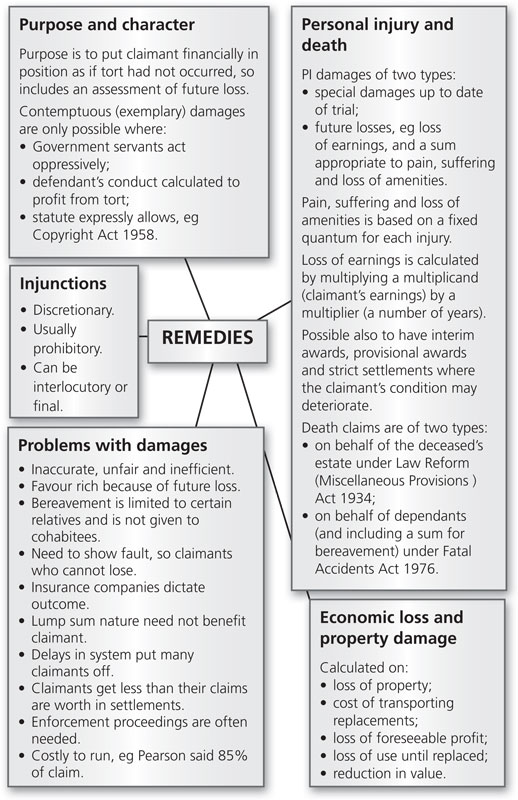Remedies and limitation periods
Remedies and Limitation Periods
11.1 Damages
11.1.1 The Purpose and Character of Damages in Tort
1. The purpose of damages in tort is to put the claimant in the position (s)he would have been in if the tort had not occurred.
 So at least one element of damages (general damages) is speculative (a prediction of what would have happened).
So at least one element of damages (general damages) is speculative (a prediction of what would have happened).
 The obvious danger is that the claimant is either under-compensated or over-compensated.
The obvious danger is that the claimant is either under-compensated or over-compensated.
2. So tort damages is an artificial remedy in many situations since it is only a monetary award.
3. There are different types of damages with different effects.
11.1.2 Non-Compensatory Damages
1. Nominal damages can be awarded if there is no actual loss, but a tort has been committed, e.g. trespass to land.
2. Contemptuous damages are awarded when the court thinks the action was unnecessary, e.g. with technical defamations.
3. Exemplary damages are designed to punish the tortfeaser:
 common elsewhere, e.g. personal injury actions in USA;
common elsewhere, e.g. personal injury actions in USA;
 but have restricted use in England and Wales;
but have restricted use in England and Wales;
 Rookes v Barnard (1964) identified three possible categories:
Rookes v Barnard (1964) identified three possible categories:
(i) where government servants act in an oppressive, arbitrary or unconstitutional manner (see House of Lords in Kuddus v Chief Constable of Leicestershire (2001));
(ii) where the defendant’s conduct is calculated to profit from the tort, e.g. in some libel actions;
(iii) where statute expressly allows, e.g. Copyright Act 1958.

11.1.3 Economic Loss and Damage to Property
1. Usually compensated as ‘special damages’.
2. Usually little problem in calculating such losses.
3. With an economic loss the claimant must be restored as closely as possible to the position if the tort had not occurred.
4. Property damage is calculated according to:
 loss of the property and its value at the time of loss;
loss of the property and its value at the time of loss;
 cost of transporting replacement property if appropriate;
cost of transporting replacement property if appropriate;
 loss of reasonably foreseeable profit;
loss of reasonably foreseeable profit;
 loss of use until the time the property is replaced;
loss of use until the time the property is replaced;
 reduction in value if damaged but not lost, ie repair costs.
reduction in value if damaged but not lost, ie repair costs.
11.1.4 Damages in Personal Injury Claims
1. This is divided into two groups.
a) Special damages:
 this is pecuniary loss up to the date of trial;
this is pecuniary loss up to the date of trial;
 can include medical care, equipment, loss of earnings, etc.;
can include medical care, equipment, loss of earnings, etc.;
 but only such expenses as the court considers reasonable, so private medical care may well be refused.
but only such expenses as the court considers reasonable, so private medical care may well be refused.
b) General damages or future damages:
 includes pecuniary losses, e.g. future earnings, medical costs, costs of care and special facilities;
includes pecuniary losses, e.g. future earnings, medical costs, costs of care and special facilities;
 and also non-pecuniary loss, e.g. pain, suffering and loss of amenities (and in the case of death, bereavement).
and also non-pecuniary loss, e.g. pain, suffering and loss of amenities (and in the case of death, bereavement).
2.